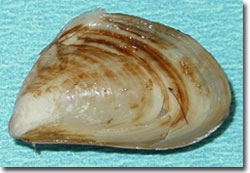It’s been a long road, but it’s time to reveal the Great Lakes SmackDown! champion.
But before we do, let’s review.
The quagga “The Quagmeister” mussel had a tough match in Round 1 but beat the zebra mussel by using its ability to cling to soft surfaces like lake bottoms. And in Round 2 the bivalve went head-to-head with the Eurasian “The Eurasian Invasion” watermilfoil, a plant the mussel uses to jump to different water bodies by clinging to its leafy parts.
In Round 1, the Sea “The Green Lamp-rey” Lamprey took on the round goby, an aggressive bottom-feeder. It defeated the fish by using its longer, more established and destructive record. And it was a tight battle in Round 2, where the eel-like fish took on an old invasive friend, the alewife. It was tough to call but readers chose the lamprey for the win.
And the winner is…

Quagga "The Quagmeister" Mussel. Photo: USGS.
THE QUAGMEISTER!
About 43 percent of those who filled out brackets chose the quagga for the win. And the mussel took 71 percent of votes in the polls.
This was a tough one and the results may best be summed up by reader Chris Kennedy.
“Never underestimate a mollusk,” she wrote in an e-mail.
Quaggas eat algae and little aquatic critters. This diet effects the food chain from the bottom up.
“As best we can tell [quaggas] had a devastating effect on the lower trophic levels of the Great Lakes,” said Mike Jones in an interview with Liz Pacheco, a news writer for the Michigan State University environmental science and policy program.
Jones is a professor and co-chair of Fisheries and Wildlife and a co-director for the Quantitative Fisheries Center at Michigan State University.
On the other hand, Jones refers to the sea lamprey as a “giant leech” and the “grand daddy” of the Great Lakes invasives due to its 70-year reign.
This fish doesn’t have any natural predators as shown by this chart created by the NOAA Great Lakes Environmental Research Laboratory and the Great Lakes Fishery Commission.
The U.S. and Canada spend millions of dollars each year controlling the parasitic fish with things like barriers and lampricides, Jones said.
These methods are considered effective by experts.
“It’s been very effective in keeping lampreys in check,” said Chuck Madenjian, a research fishery biologist with the U.S. Geological Survey Great Lakes Science Center.
But for quaggas, these kinds of controls aren’t clear. And some scientists say that it’s time to learn to co-exist rather than try to eliminate them.
“There is no reaching a happy medium anymore because … quagga mussels are in control. We have to learn to live with that,” said Dave Kelch, an associate professor and sea grant extension specialist at the Ohio Sea Grant College Program.
When asked which contender would prevail in a SmackDown!, Jones chose the sea lamprey:
“If had to be stuck in a tank with one of those two critters — a sea lamprey or a quagga mussel — there is not much doubt in my mind that I’d rather spend my time hanging out with quagga mussels,” he said.
And here at Echo we’d have to agree that facing a quagga the size of your thumbnail is far less intimidating than facing a lamprey.
But, the lack of effective control methods for quaggas and their ecological impact, such as clogging waterways, building up toxins in their systems and eating up the bottom of the food chain, makes this mussel the champ.
But all invasives, and how they got here, should be of concern.
“Everybody is concerned about Asian carp. Let’s do something about the ballast water. That’s important, but it’s just as important as keeping species coming through St. Lawrence Seaway. Both are critical issues. Both should be held in highest degree, we should do something about this. It’s Asian carp that’s taking the limelight,” Kelch said.
The making of the SmackDown!
Readers weren’t shy to voice their opinions about our SmackDown! set up. If there is a return of the SmackDown! we’ll keep these suggestions in mind.
Jaqueline Pilette wanted to see some more plants in the running.
“I think you guys should add another bracket for invasive phragmites … and purple loosestrife,” she wrote in an e-mail.
Nate Drag wanted a write-in option on the brackets.
“My write in votes would be for Japanese knotweed and spiny water flea,” he wrote.
The spiny water flea is a favorite of Echo editor David Poulson too.
But some of you thought a little more outside the box.
One of our experts Dave Kelch suggested an interesting match-up: The Asian carp vs. the Obama Administration. Echo’s bet is on the carp.
Several readers pointed out a legitimate concern about the absence of one super-invasive on the list: Us.
“Why aren’t humans on the list? They are the obvious winner,” Gordon, an Echo reader, wrote.
And with that Echo would agree. The human species has caused catastrophic damage and immeasurable changes to the lakes. Not to mention it’s our fault through faulty ballast water regulations, globalization and our want of cool aquarium plants that our SmackDown! contenders are here.
So unofficially, we are all SmackDown! winners…and really, losers at the same time.
Thank you for playing. We hoped you learned something.
Alice Rossignol & Rachael Gleason
 GREAT LAKES SMACKDOWN!
GREAT LAKES SMACKDOWN!
Click here to see how the quagga mussel became the most destructive species in the region.
